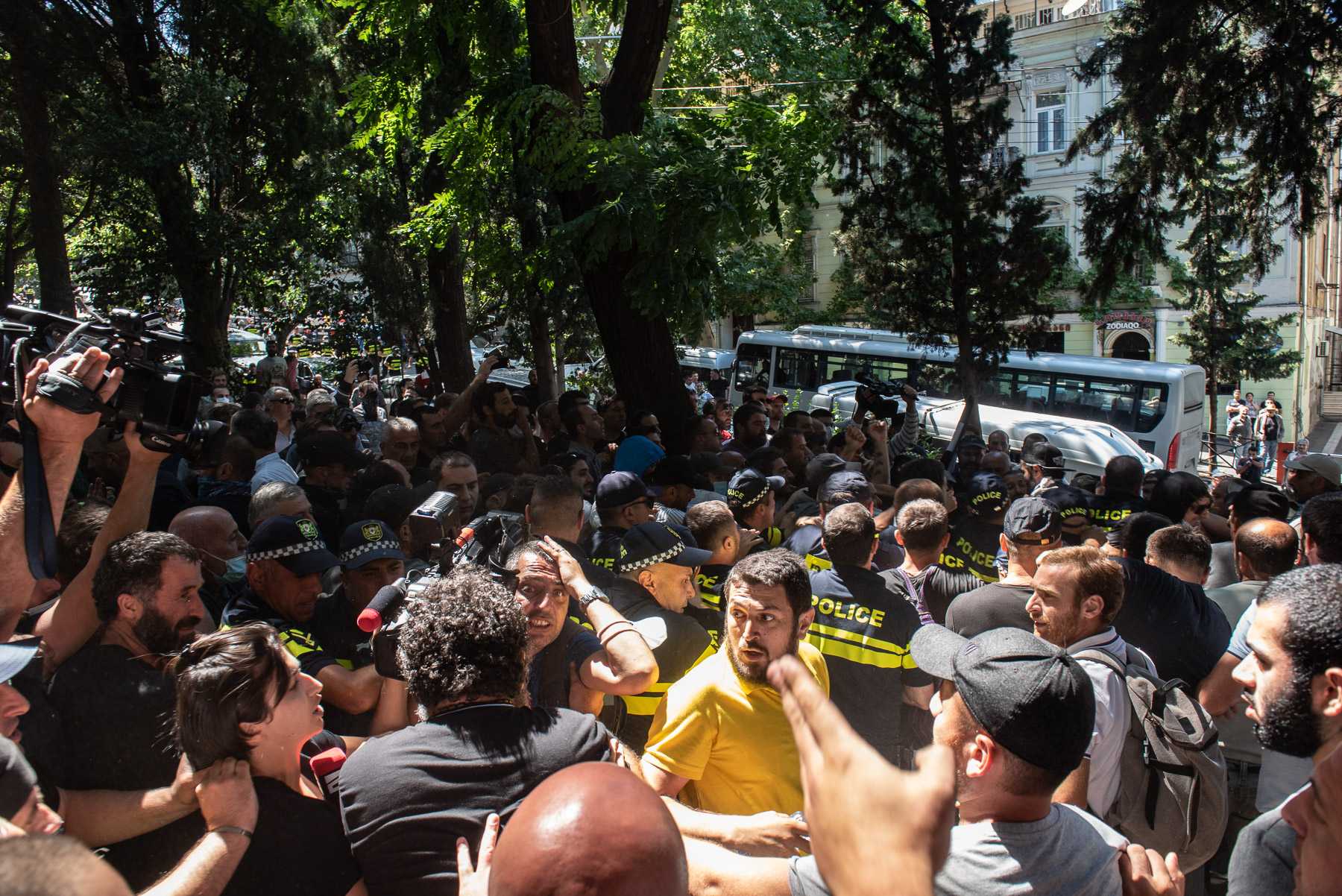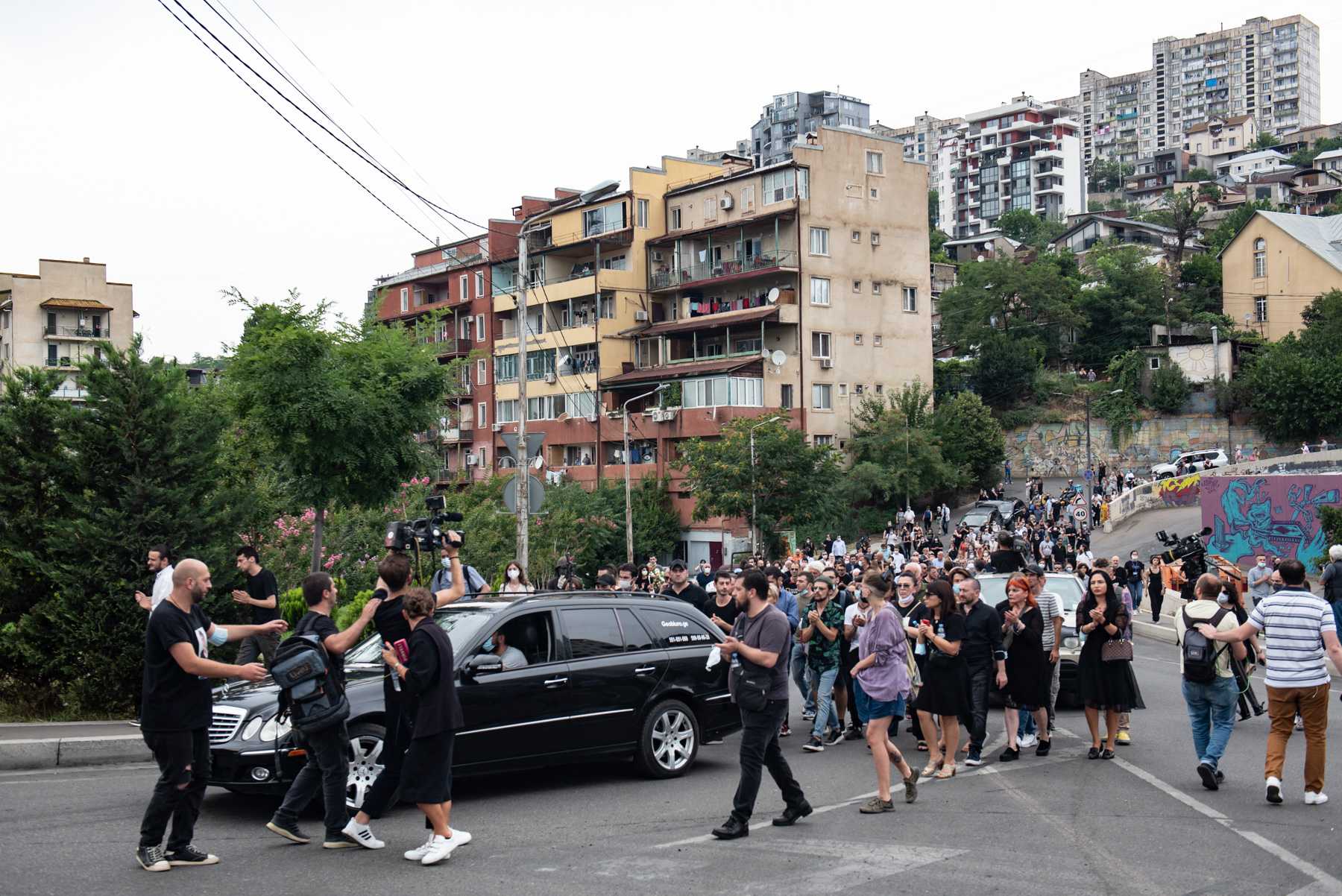
On 5 July, what was to be Georgia’s first Pride march turned into a hunt for journalists. One thing the media workers covering the protests unanimously agreed on: Georgian authorities failed in their duty to protect the free press.
‘I have a broken nose, stitches, and five broken teeth. Everything happened very quickly. We tried to get to the car, but when I opened the car door, I suddenly felt a blow to my face. Before I could think and figure out where the blood was coming from, my colleague started screaming and telling the attackers that we were journalists.’
On 5 July, in the early afternoon, RFE/RL journalist Tornike Mandaria was in Tbilisi’s Vake district covering what was meant to be Georgia’s first-ever Pride March. The march, which was planned but never took place, was anticipated by thousands of homophobic demonstrators who were called to the streets by the Georgian Orthodox Church.
Mandaria was standing next to Tbilisi Pride head Giorgi Tabagari and was a few metres away from a group of police officers when the mob attacked them. The police only moved to help them when they began screaming.
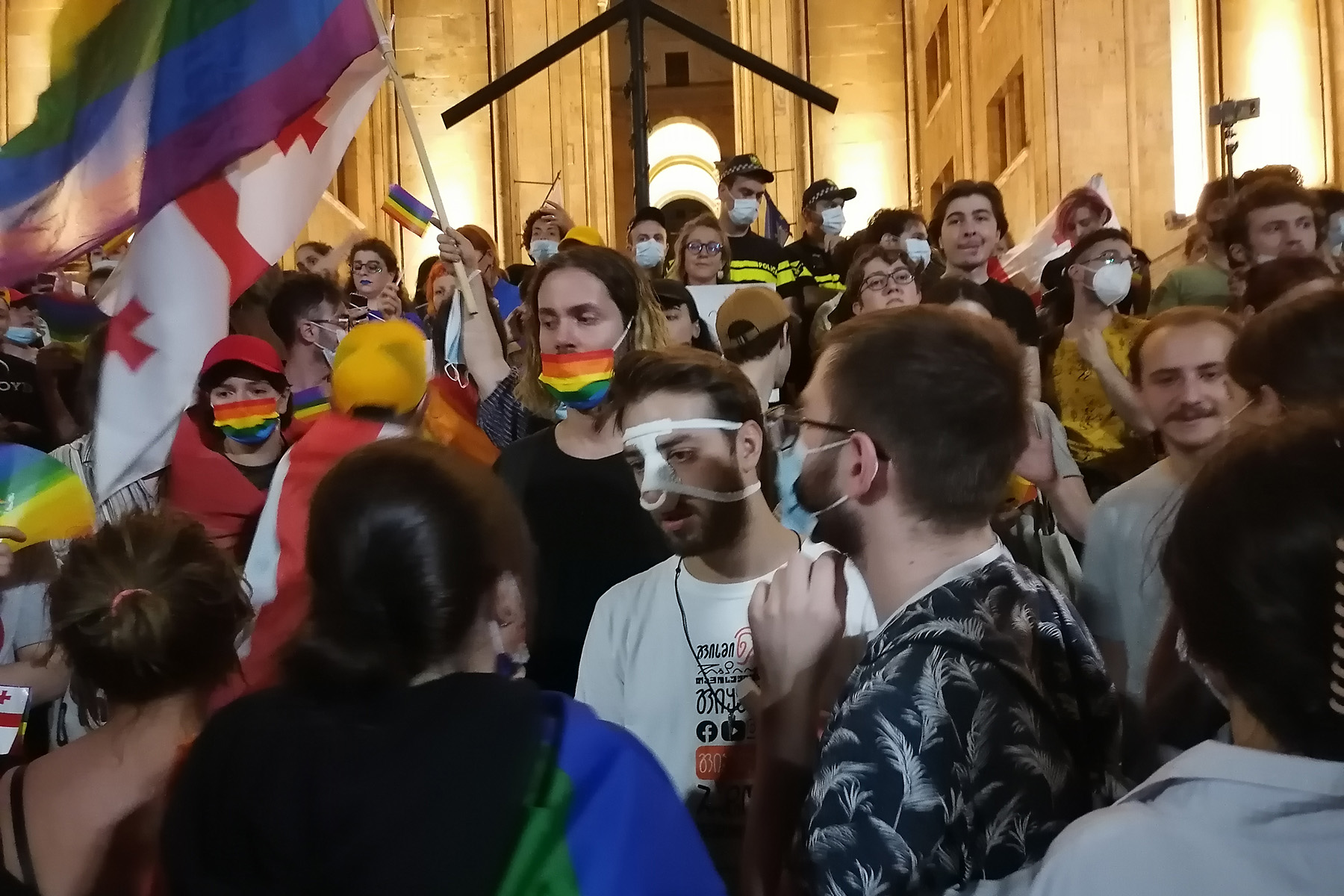
He was one of 53 journalists injured that day — the most violent day for journalists in Georgia since the 2008 August War.
According to Georgia’s Interior Ministry, just 7 people have been arrested for attacking journalists and other media workers. The police have also opened investigations into the illegal interference into journalists’ work and acts of violence, including the attacks on the offices of two NGOs — the Shame Movement and Tbilisi Pride.
[Read on OC Media: Homophobic mob celebrates on Tbilisi streets after Pride march cancelled]
Georgian television channels Formula, Pirveli, Rustavi 2 and the online news agencies Tabula and Palitranews were the first to report that their journalists were attacked.
On 5 July, the Justice for Journalists Foundation, a London-based advocacy group, claimed to have registered 107 attacks on 54 media workers, including 14 women journalists. The group called on the Georgian government to ‘conduct a thorough investigation’.
The same day, Denis Krivosheev, Amnesty International’s Deputy Director for Eastern Europe and Central Asia, rebuked Georgian authorities for their failure to provide a robust response to the violence, which he said was ‘as lamentable as it was predictable’.
On 6 July, Anthony Bellanger, General Secretary of the International Federation of Journalists called the attacks against the media professionals and queer activists ‘shocking’.
European Federation of Journalists Director Renate Schroeder, meanwhile, called on Georgia to ‘hold to its commitment to democratic values by ensuring that freedom of expression remains one of its core principles’.
‘Well, what did you think was going to happen?’
Before attacking the journalists, protesters demolished tents that had been erected by political opposition groups after the last parliamentary election. The police stood by as the tents were destroyed.
Apparent police inaction continued through the day.
‘The police were in front of us and didn’t do anything at all’, Tornike Mandaria told OC Media. ‘I do not remember the exact wording, but this one police officer told me: “Well, what did you think was going to happen if you were going to a rally organised by faggots?” ’
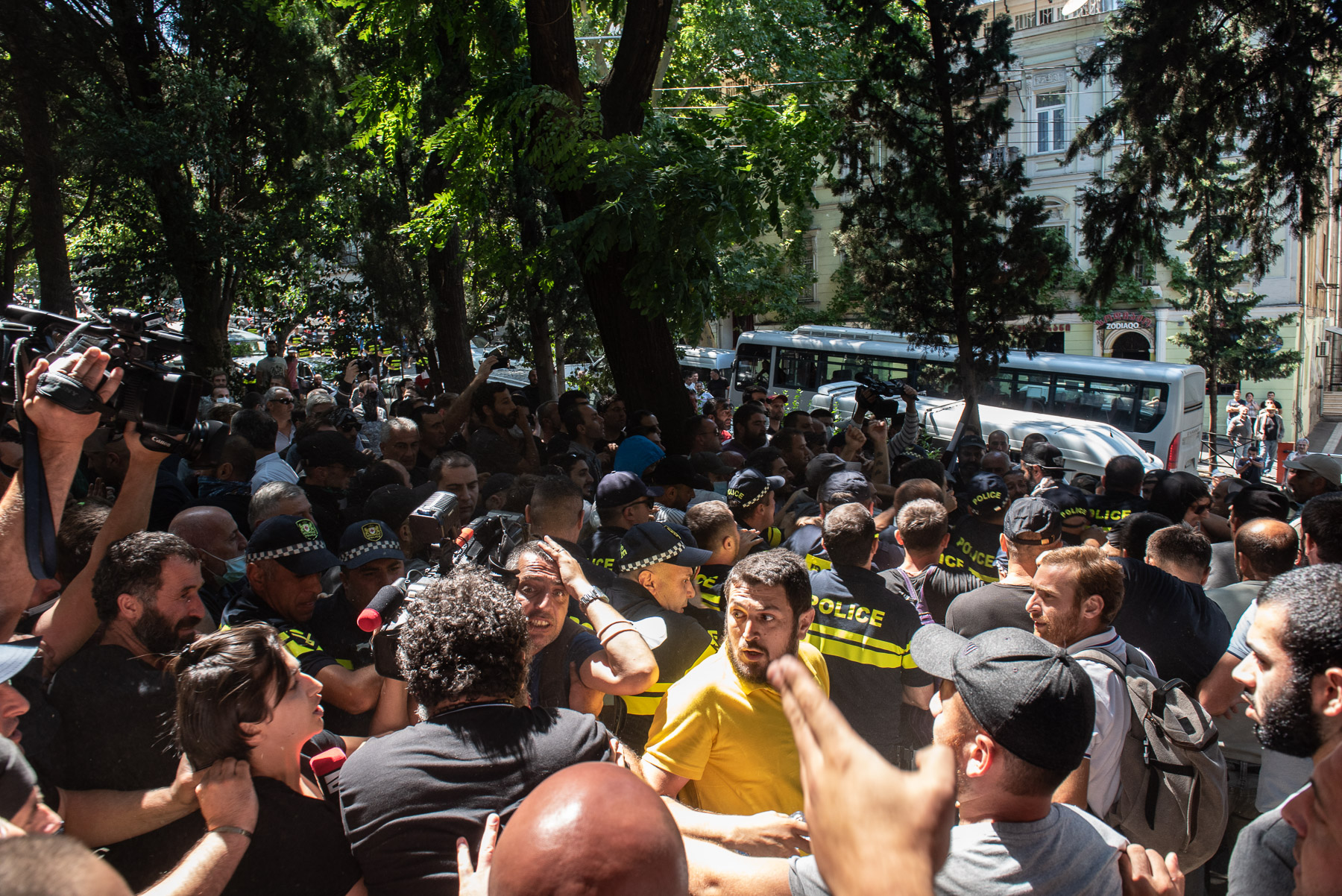
Tornike’s colleague, Dato Koridze, who works as a camera operator for RFE/RL, also fell victim to the homophobic mob.
‘I was attacked by about 10–20 men’, he told OC Media. ‘I tried to escape, but someone hit me in the back and I fell down’.
‘They beat me non-stop for a few minutes and the women passing by started screaming, after which three to four police officers dressed in civilian clothes came and got me out of there.’
Attacked by clergy
Georgian Orthodox priests also indulged in the violence and mayhem.
Rati Tsverava, a journalist at Formula, told OC Media that he had approached a priest near the parliament to ask what he thought of the day’s violence.
The priest rebuffed him, and then, according to his recounting, about ten people, including members of the clergy, began to drag him towards the barricades in front of the parliament building, cursing him all the while.
‘Then they started beating me and hitting me in the back’, Tsverava recalled. ‘After that, I started to run, but I saw that everyone was following me. Someone pulled my shirt from behind, and one of the priests poured hot coffee on me.’
Footage of the attack on Tsverava from Kavkasia TV.
Tsverava said that he was chased by several dozen people, who then proceeded to pummel him for over 10 minutes, using their hands, their feet, and even a set of crutches.
He said one police officer tried to help him but was prevented from doing so by the sheer number of attackers.
A hail of glass and stone
RFE/RL journalist Tamuna Chkareuli told OC Media that the whole day that she had been reporting, protesters had shouted homophobic slurs at her and other journalists. She was near the parliament when she came under fire.
She was documenting an argument between a young woman and some protesters when a small crowd began to gather. They went after the woman, who was escorted from the scene by police.
‘But these men followed anyway, and we followed them’, Chkareuli recalled. ‘Police tried to hold them back, but they were too few.’ Then, she said, someone in the crowd shouted that instead of attacking the police and the young woman they should attack the journalists.
Chkareuli and another journalist working for TV Pirveli immediately bolted, and she hid behind a car. ‘As we were running, people from the crowd were throwing glass and plastic bottles as well as stones’, she said.
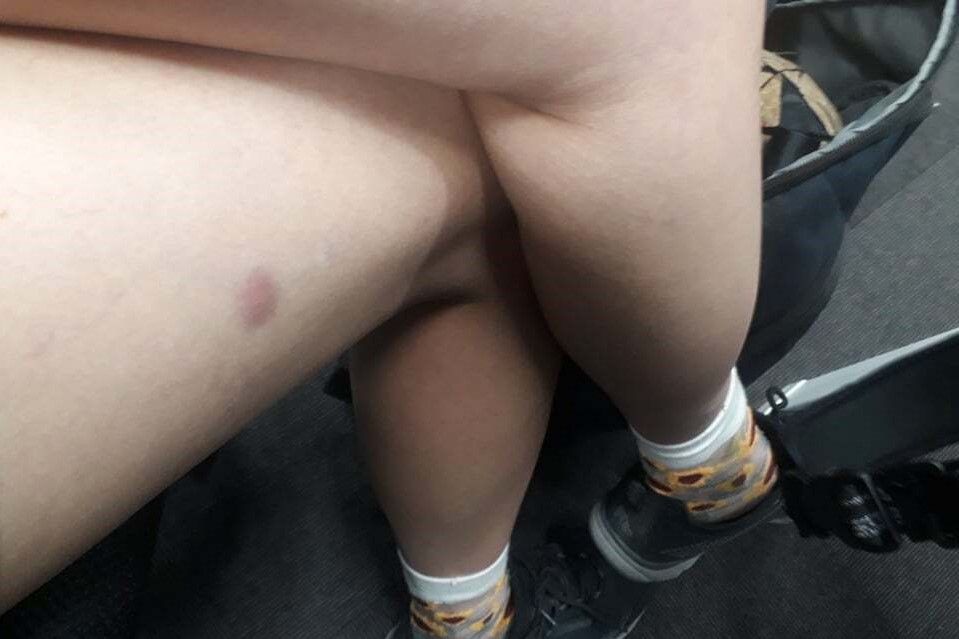
At least six journalists were hospitalised that, their injuries include fractured bones, concussions, temporary amnesia and severe damage to the eyes from an apparent acid attack. Three still remain in hospital.
The next day, a homophobic mob once again roamed the streets and the attacks continued. Shortly before a demonstration against the violence was due to begin, a group of men assaulted a camera operator working for Palitranews in front of Parliament.
[Read more: EU flag torn down from Georgian Parliament in second day of far-right street violence]
Additional reporting by Shota Kincha.




